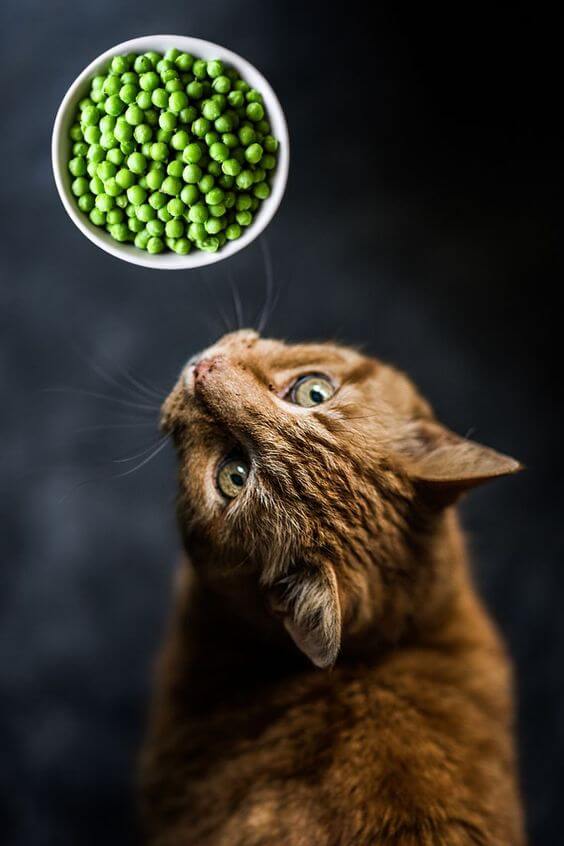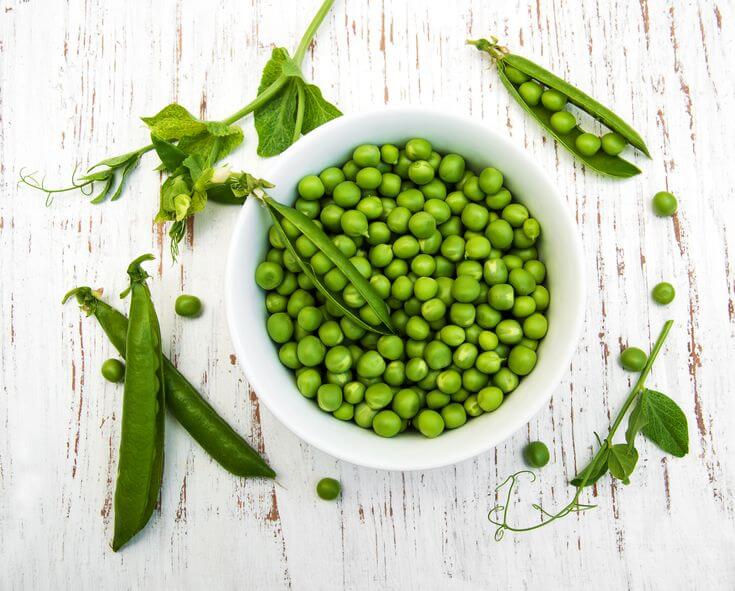“Curious about whether cats can safely eat peas? Can Cats Eat Peas? Discover the nutritional benefits of peas for cats and potential risks to consider. Get expert recommendations from veterinarians. Find out if peas are a suitable addition to your feline friend’s diet.” As cat owners, we want to ensure that our furry friends are getting the best nutrition possible.

With the increasing popularity of peas as a healthy vegetable for humans, you might be wondering if it’s safe to share this green goodness with your feline companion. In this blog post, we will explore the nutritional benefits and potential risks of feeding peas to cats, helping you make an informed decision about including peas in your cat’s diet.
Introduction
Peas are a type of legume that have been cultivated for thousands of years and are often used as a nutritious addition to human meals. They are loaded with essential vitamins, minerals, and antioxidants that provide numerous health benefits. As pet owners, we always want to share our healthy habits with our furry companions. However, it’s important to remember that cats have different nutritional needs than humans, and not all human foods are safe or suitable for felines. So, before you start sharing your peas with your cat, let’s take a closer look at the potential benefits and risks.
Why Peas Are Healthy For Cats
Peas are a fantastic source of essential nutrients that can support your cat’s overall health. Some of the key benefits include:
- High in Protein: Peas are an excellent source of plant-based protein, containing around 5-9 grams per cup. This is important for cats, as they require a high-protein diet to maintain their lean muscle mass.
- Rich in Vitamins and Minerals: Peas contain important vitamins and minerals such as vitamin A, C, K, potassium, iron, and magnesium. These nutrients are crucial for your cat’s immune system, bone health, and overall well-being.
- High Fiber Content: A cup of peas contains around 9 grams of fiber. This can help improve digestion and regulate blood sugar levels in cats, especially if they are overweight or have diabetes.
- Low in Calories: Peas are low in calories, making them a great snack for cats that need to watch their weight.
- Antioxidant Boost: Peas are packed with antioxidants that can help reduce the risk of chronic diseases and support your cat’s immune system.
How To Feed Peas To Your Cat
If you’ve consulted with your veterinarian and have decided to introduce peas into your cat’s diet, it’s essential to do so carefully. Here are a few tips to keep in mind:
- Cooked is Best: Raw peas can be difficult for cats to digest, so it’s best to cook them before feeding them to your feline friend.
- Moderation is Key: Peas should be given to cats in moderation, as too much can lead to digestive upset. Start with a small amount and gradually increase if your cat shows no adverse reactions.
- Avoid Seasonings: Cats have sensitive stomachs, and adding seasonings or other flavorings to peas can cause digestive issues. Stick to plain, cooked peas without any additional ingredients.
- Peas as a Treat: While peas are generally safe for cats, they should not replace a complete and balanced diet. They can be given as an occasional treat in addition to your cat’s regular meals.
- Choose Organic: When possible, opt for organic peas to avoid any potential exposure to pesticides or other harmful chemicals.
Can Cats Eat Peas?
Before introducing peas into your cat’s diet, it’s important to be aware of potential risks or precautions. Some cats may have difficulty digesting peas, leading to digestive upset such as vomiting or diarrhea. Additionally, peas contain carbohydrates, which are not a necessary component of a cat’s diet. Feeding too many peas could result in an imbalance of nutrients and potentially lead to weight gain or other health issues.
It’s always best to consult with your veterinarian before making any significant changes to your cat’s diet. They can provide personalized advice based on your cat’s specific needs and help you determine if peas are a suitable addition to their meals.

Peas In Cat Food
If you’re not comfortable feeding your cat peas as a standalone snack, there are many high-quality cat food brands that now include peas in their recipes. These formulas are carefully balanced to meet your cat’s nutritional needs, making them a safe and convenient option for providing the benefits of peas without any potential risks. We recommend consulting with your veterinarian to determine if a pea-based cat food is suitable for your cat. We also suggest looking for formulas that use whole, minimally processed peas rather than pea protein or other derivatives. The closer the food is to its natural form, the more likely it is to provide your cat with all the benefits of peas.
Final Thoughts
In conclusion, while peas offer numerous health benefits for humans, they should be introduced to a cat’s diet with caution. While some cats may tolerate and even benefit from a small amount of peas in their meals, others may experience adverse effects. It’s always best to consult with your veterinarian before making any significant changes to your cat’s diet. Additionally, it’s important to remember that cats have unique nutritional needs, and their diets should primarily consist of animal protein.
So, while peas may be safe for your cat to eat in moderation, they should not be considered a necessary or essential component of their diet. So, if you do decide to share some peas with your feline friend, remember to do so in moderation and continue to prioritize a balanced and appropriate diet for your cat’s overall health and well-being. So go ahead and enjoy some peas with your cat, but always keep their specific dietary needs in mind.
FAQS
Q: Can peas be fed to cats as a regular part of their diet?
A: While some cats may tolerate and even benefit from a small amount of peas in their meals, it’s important to consult with your veterinarian before making any significant changes to your cat’s diet. They can provide personalized advice based on your cat’s specific needs. Additionally, the primary component of a cat’s diet should be animal protein.
Q: Are there any potential risks of feeding peas to cats?
A: Yes, some cats may have difficulty digesting peas, leading to digestive upset. Additionally, peas contain carbohydrates that are not a necessary component of a cat’s diet and could potentially lead to weight gain or other health issues if consumed in excess. It’s important to monitor your cat’s response to peas and consult with a veterinarian if any adverse effects occur.
Q: What are some alternative sources of nutrients for cats?
A: Cats have different nutritional needs than humans and require a diet that is primarily composed of animal protein. High-quality commercial cat food is formulated specifically to meet their dietary requirements. Other nutritious options for cats include cooked meat, eggs, and small amounts of fruits or vegetables that are safe for felines. It’s always best to consult with a veterinarian before adding any new foods to your cat’s diet.
Q: Are there any specific benefits of feeding peas to cats?
A: Peas contain antioxidants that can support immune function and eye health. They also provide fiber, which may aid in digestion and promote healthy bowel movements. However, these potential benefits can also be obtained from a balanced diet formulated specifically for cats.
Q: Can I feed frozen peas to my cat?
A: It’s best to avoid feeding your cat frozen peas as they can be a choking hazard. Thawed, cooked peas are a safer option if you choose to share them with your feline friend. Overall, it’s important to remember that while some cats may enjoy peas in small amounts, they should not be considered a necessary or essential component of their diet. So, always prioritize a balanced and appropriate diet for your cat’s overall health and wellness.
Conclusion
In conclusion, while peas offer some nutritional benefits, it’s important to consider a cat’s unique dietary requirements and individual health needs. Consulting with your veterinarian is crucial before introducing any new foods into your cat’s diet. They can provide tailored guidance and ensure that your cat is receiving a balanced and appropriate diet. Remember, your cat’s health and well-being are always the top priority. We hope this guide has helped answer any questions you may have had about cats eating peas. We wish you and your furry friend all the best in their dietary journey! So, go ahead and give your cat a treat of peas now and then, but remember to keep their overall diet in mind.
